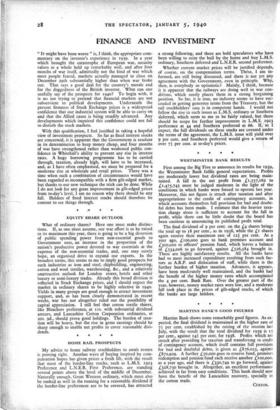FINANCE AND INVESTMENT
" IT might have been worse " is, I think, the appropriate com- mentary on the investor's experience in 1939. In a year which brought the catastrophe of European war, security values as a whole held up remarkably well, and after four months of war itself, admittedly not the kind of war which most people feared, markets actually managed to close on December 29th substantially higher than when war broke out. That says a good deal for the country's morale and for the doggedness of the British investor. What can one usefully say of the prospects for 1940? To begin with, it is no use trying to pretend that financial markets are not subservient to political developments. Underneath the present firmness of Stock Exchange prices is a widespread confidence that our industrial system will be able to carry on and that the Allied cause is being steadily advanced. Any developments which impaired this confidence could not fail to disturb the stock markets.
With this qualification, I feel justified in taking a hopeful view of investment prospects. So far as fixed interest stocks are concerned, it is apparent that the Government is resolute in its determination to keep money cheap, and four months of war have strengthened rather than weakened public con- fidence in Whitehall's ability to prevent any rise in interest rates. A huge borrowing programme has to be carried through, taxation, already high, will hai7e to be increased, and, as I have often emphasised, we must be prepared for a moderate rise in wholesale and retail prices. There was a time when such a combination of circumstances would have been regarded as incompatible with a firm gilt-edged market, but thanks to our new technique the trick can be done. While I do not look for any great improvement in gilt-edged prices from to-day's level, I see no reason why there should be any fall. Holders of fixed interest stocks should therefore be content to see things through.
* .* * *


































 Previous page
Previous page